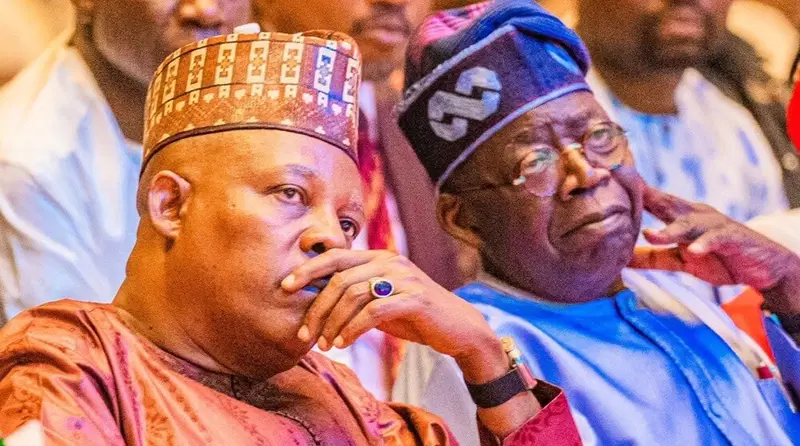
Is Shettima rebelling against Tinubu?
No, his comments have no link with Fubara — Presidency
PICTURE a Vice President stepping up to a podium, his voice calm but heavy with meaning. Every word lands like a stone in water.
That was the scene on Thursday at the Yar’Adua Centre in Abuja, as Vice President Kashim Shettima spoke at the launch of ‘OPL 245: Inside Story of the $1.3 Billion Nigeria Oil Block,’ a memoir by former Attorney General Mohammed Bello Adoke.
What started as a tribute to Adoke’s integrity soon took a dramatic turn. Shettima’s account of how he survived a 2014 plot to remove him as Governor of Borno State under President Goodluck Jonathan has stirred debate: was he indirectly criticising President Bola Tinubu’s controversial suspension of Rivers State Governor, Siminalayi Fubara?
In Nigeria’s charged political space, where loyalty and ambition constantly clash, Shettima’s speech raises a key question: Is he challenging the very government he serves?
This is Nigeria’s political chessboard, where every move is analysed. Shettima, a veteran of Borno’s stormy years, shared how he was once seen as the nation’s prime enemy during the peak of the Boko Haram crisis.
His story opens the door to a wider conversation about leadership, the limits of the constitution, and the fragile balance that holds Nigeria’s democracy together.
A Governor’s Trial and a Lawyer’s Stand
Shettima took the audience back to 2014. At the time, Borno was under siege from insurgents, and he was under intense pressure as its governor. During a Federal Executive Council meeting, Jonathan reportedly considered removing him from office, a move that would have pushed constitutional limits.
Then came Adoke’s intervention. The former Attorney General stood firm.
“Mr. President, you lack the constitutional authority to remove a sitting governor, not even a local government councillor,” Adoke reportedly said, with support from fellow cabinet member and Senior Advocate, Kabiru Turaki.
Their advice prevailed, and Shettima remained governor. It forged strong bonds among Shettima, Adoke, Turaki and then-House Speaker Aminu Waziri Tambuwal, united in their stand for the rule of law.
The episode shows the importance of legal advice in checking political power. But why is Shettima revisiting it now?
His praise for Adoke’s “fearless moral fortitude” feels like more than a history lesson. It shines a light on today’s political tensions, especially in Rivers State, where Governor Fubara’s suspension has raised eyebrows.
A Subtle Critique or Just a Reflection?
Shettima called Adoke a ‘paragon of indomitable courage’, someone who stood firm in tough times. His words seem to echo into today’s political climate, where President Tinubu’s actions in Rivers have drawn comparisons.
In Rivers, a state of emergency and Fubara’s suspension were explained as responses to political violence. But critics say they go too far and lack constitutional backing.
By contrast, Jonathan listened to legal advice and stepped back. Tinubu acted swiftly, and critics argue that democratic structures were weakened.
Shettima’s focus on legal limits and unity stands in sharp contrast to the unrest in Rivers.
He also noted how figures from across political parties, including PDP, APC, NNPP, and others, were all in attendance at the event.
“What binds us together surpasses whatever divides us… Senator Daggash, are you in ADC or APC or PDP? Only God knows,” he joked.
These light-hearted moments, observed by media personality Dr Reuben Abati as ‘jovial,’ still carried sharp political undercurrents.
History as a Mirror for Today
Rivers’ crisis, with its broken State Assembly and impeachment drama, resembles the type of political manoeuvring Shettima described from his past. Is his speech a quiet protest? Is he eyeing the future?
Arise TV anchor, Rufai Oseni, didn’t hold back. He criticised both Jonathan and Tinubu, but more strongly condemned Tinubu’s actions in Rivers.
“The frivolousness of suspending Governor Fubara was shocking,” Oseni said. He wondered why no one like Adoke stood up to advise the president today.
His view tied neatly into the core of Shettima’s speech: that sound legal advice protects democracy.
Dr Reuben Abati, who was present in 2014 and at Shettima’s speech, offered a different view.
“The circumstances in 2014 were entirely different,” he said, pointing out that Borno faced a national security crisis, while Rivers is dealing with political infighting.
He also clarified that Shettima talked about removal, not suspension, and didn’t aim to criticise Tinubu.
Still, the comparisons are hard to ignore. Some say Shettima may be preparing to challenge the system from within, perhaps with 2027 in mind.
Unity Reaffirmed in Presidency, Doubts Remain
The Vice President’s office quickly responded to the growing controversy. A statement signed by Stanley Nkwocha called media reports “a gross misrepresentation” of Shettima’s speech.
The statement stressed that his remarks were simply a historical reflection, not a swipe at Tinubu.
It defended Tinubu’s actions as constitutional, citing Section 305 of the constitution, which allows for federal action in states facing a breakdown of public order. It also stated that Fubara was suspended, not removed, and that both the House of Assembly and the National Assembly were involved.
“Shettima stands shoulder to shoulder with Tinubu,” the statement declared, urging the media to avoid sowing division.
But even with that assurance, the questions remain.
His remarks, even if made in passing, reveal the delicate state of Nigerian democracy. Is Shettima a loyal deputy? Or is he making a calculated move on the national stage, perhaps with 2027 in mind?
Only time will tell.


